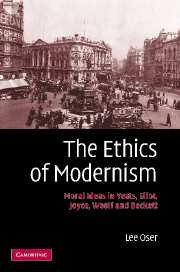Book contents
- Frontmatter
- Contents
- Acknowledgments
- Introduction: literature and human nature
- 1 W. B. Yeats: out of nature
- 2 T. S. Eliot: the modernist Aristotle
- 3 James Joyce: love among the skeptics
- 4 Virginia Woolf: Antigone triumphant
- 5 Samuel Beckett: humanity in ruins
- Conclusion: technology and technique
- Notes
- Works Cited
- Index
1 - W. B. Yeats: out of nature
Published online by Cambridge University Press: 22 September 2009
- Frontmatter
- Contents
- Acknowledgments
- Introduction: literature and human nature
- 1 W. B. Yeats: out of nature
- 2 T. S. Eliot: the modernist Aristotle
- 3 James Joyce: love among the skeptics
- 4 Virginia Woolf: Antigone triumphant
- 5 Samuel Beckett: humanity in ruins
- Conclusion: technology and technique
- Notes
- Works Cited
- Index
Summary
The moral ideas behind Yeats's early poems stand for inspection in his 1903 collection of essays, Ideas of Good and Evil. In one of the book's major expressions of doctrine, “William Blake and His Illustrations to The Divine Comedy,” Yeats expounds Blake's “opinions” of Dante, which could not have been pleasing to the Catholic bishops of Ireland. He starts by splitting Dante in two. He admits by way of Blake that “Dante, because a great poet, was ‘inspired by the Holy Ghost.’ ” Quickly, though, he turns his attention to Dante's “worldly” philosophy, “established for the ordering of the body and the fallen will.” He calls Dante's ethics “the philosophy of soldiers, of men of the world, of priests busy with government, of all who, because of their absorption in active life, have been persuaded to judge and to punish …” Yeats's hostility to “the active life” has English and continental sources, for example, in Pater and Villiers. Yeats compounds this hostility with Blake's gnostic theory of the imagination, which he sums up in “The Moods”: “Everything that can be seen, touched, measured, explained, understood, argued over, is to the imaginative artist nothing more than a means, for he belongs to the invisible life …” As an active, worldly man, Dante is one of the fallen, the “drudges of time and space.” He is a creature of “reason builded upon sensation.”
- Type
- Chapter
- Information
- The Ethics of ModernismMoral Ideas in Yeats, Eliot, Joyce, Woolf and Beckett, pp. 25 - 43Publisher: Cambridge University PressPrint publication year: 2007



